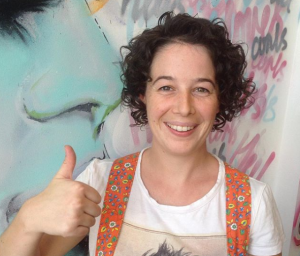What’s election day like for an autistic person?
Posted on
Written by Amaze employee and autistic adult Joel Wilson
In the lead up to the Victoria state election 2018, I interviewed my Amaze colleague and autistic woman Prue Stevenson about voting accessibility for autistic people.

Joel Wilson: Have you voted in a state or Federal election before?
Prue Stevenson: Yes. I don’t think I’ve missed any and I’ve been voting since I turned 21 I think, which was in 2011.
JW: Is voting accessible for you?
PS: When I first became of age to vote, I asked my Dad if I could get off the voting list because I find it very overwhelming. Dad said he thinks it’s important that I vote.
I’ve never voted by myself before. It’s a lot of information in terms of working out who to vote for and where I need to be at what time.
I don’t know how to find out when I need to vote, so I always get anxious when I hear people talking about it unless someone has told me when I need to [vote].
I don’t have a formal education and I am also dyslexic, which means all the reading and writing can make me anxious.
There’s lots of reading and writing [required to vote] and most of the autistic community are barred from mainstream schooling so it’s unfair to assume we can access voting in the mainstream way. There is too much information, and it’s written too academically for me to feel confident to process. Also, I remember colours, not names.
JW: Is election day a sensory challenge?
Each time that I’ve voted on [election] day, I’ve experienced sensory overload and had a meltdown, which I’ve always had to push through. This means my brain doesn’t work at full capacity and the choices I make can be governed by my mind and body going into shut down mode.
With the combination of my widened sensory perception and big crowds on voting day, I get claustrophobic and sensitive to touch, sounds and smells. There are lots of people with paper and information getting in my space and not allowing me the time I need to process information. If I leave the line due to a meltdown, I’ll lose my spot, so I end up having the meltdown in the line so I can go home sooner.
On top of everything else on voting day, I’m left in an environment that is not too kind on my autistic brain and I have to socialise with people who are usually in a hurry, anxious or grumpy.
JW: Do you follow politics at all? It’s okay if you don’t !
PS: Being in a minority group makes you political whether you’re aware of it or not. I don’t have a TV, I don’t read the newspaper and I rarely go on the internet, so I learn most of what is going on in the world through word of mouth. This works for me because I can’t process all that jibber-jabber. I need to ask a person to repeat and explain what they’ve said so that I can process it.
My partner helps me go onto vote compass for the federal elections. I struggle to understand and answer the questions by myself. I know what I like and don’t like, I just don’t know it in written academic language.

JW: Do you think it’s important that autistic people and people with other disabilities have access to vote?
PS: I do, I think it’s important because in this day and age our communities should have equality and part of equality is having a say and being heard. The disability community are the most diverse community I know and our community has a lot to say.
On education for example, I believe that IQ tests are discriminatory because they’re designed for a particular neurotype to hit bang on average, and have a goal to get beyond average. This means that for people with a different neurotype who have a spiky IQ, the education system makes them feel extremely unintelligent and therefore unimportant. This is when our community start to become depressed and fall down loopholes in the system—because the system is designed by people who do well in that system.
JW: Do you have any advice for other autistic people on the voting process?
PS: I would vote at an early voting centre. It’s important to get more than one perspective on politics and who you could vote for because most people are biased. It’s important that who you vote for is your decision and not someone else deciding for you.
JW: Is there anything else you would like to say?
PS: It would be helpful to have more information on how to vote in picture format and for language to be simplified where possible so that more people can access the information and process it independently.
Prue’s voting checklist
When voting in the past, have you:
- Voted in person on the day of the election? Yes
- Registered for postal voting? No
- Voted early at a polling centre before the election day? Yes
This year, Prue will be voting at an early voting centre with our colleague Fiona Ransley.